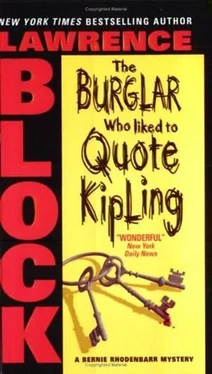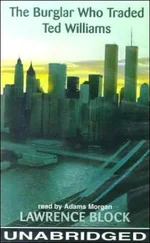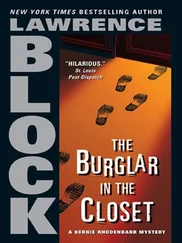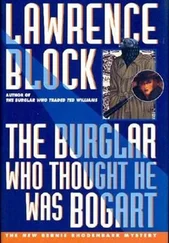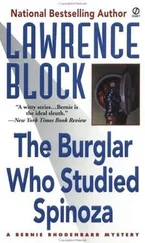Lawrence Block - The Burglar Who liked to Quote Kipling
Здесь есть возможность читать онлайн «Lawrence Block - The Burglar Who liked to Quote Kipling» весь текст электронной книги совершенно бесплатно (целиком полную версию без сокращений). В некоторых случаях можно слушать аудио, скачать через торрент в формате fb2 и присутствует краткое содержание. Жанр: Триллер, на английском языке. Описание произведения, (предисловие) а так же отзывы посетителей доступны на портале библиотеки ЛибКат.
- Название:The Burglar Who liked to Quote Kipling
- Автор:
- Жанр:
- Год:неизвестен
- ISBN:нет данных
- Рейтинг книги:4 / 5. Голосов: 1
-
Избранное:Добавить в избранное
- Отзывы:
-
Ваша оценка:
- 80
- 1
- 2
- 3
- 4
- 5
The Burglar Who liked to Quote Kipling: краткое содержание, описание и аннотация
Предлагаем к чтению аннотацию, описание, краткое содержание или предисловие (зависит от того, что написал сам автор книги «The Burglar Who liked to Quote Kipling»). Если вы не нашли необходимую информацию о книге — напишите в комментариях, мы постараемся отыскать её.
The Burglar Who liked to Quote Kipling — читать онлайн бесплатно полную книгу (весь текст) целиком
Ниже представлен текст книги, разбитый по страницам. Система сохранения места последней прочитанной страницы, позволяет с удобством читать онлайн бесплатно книгу «The Burglar Who liked to Quote Kipling», без необходимости каждый раз заново искать на чём Вы остановились. Поставьте закладку, и сможете в любой момент перейти на страницу, на которой закончили чтение.
Интервал:
Закладка:
“And your first name-”
“Is James, as it happens, and I don’t use it either. James Rudyard Whelkin. I was eight years old when Kipling died and I remember the day very well. That was in 1936, just two days after George V preceded him to the grave. A day of mourning in our household, as you can well imagine. My father admired Kipling enormously. He’d have to have done, to name his only son after him, wouldn’t he? Because I was named for Kipling, of course, not for a lake in Staffordshire. ‘First the old king and now the Bard of Empire,’ my father said. ‘Mark my words, Ruddy. There’ll be war in Europe within the next two years.’ He was off by a year of course, and I don’t suppose Kipling’s demise had much to do with Hitler’s invading Poland, but it all linked up in the old fellow’s mind, you see.” He smiled fiercely and his great eyebrows shook. “Are you interested in Kipling, Mr. Rhodenbarr?”
“I read him when I was a kid.”
“You might try him again. He’s returning to fashion, you know, after altogether too many years of neglect. Have you had a look at Kim lately? Or The Light That Failed ? Or-But reading must be a bit of a busman’s holiday for you, eh? Must grow sick and tired of the printed word by the end of a long day.”
“Oh, I still enjoy reading. And maybe I will try Kipling again.”
“Do. There’s books on your own shelves, for a starter.” An appraising glance from his alert brown eyes. “I say, sir. Do you suppose you could possibly lunch with me this afternoon? I might have something to say that would interest you.”
“I’d like that.”
“My club, then. Do you know the Martingale? And how’s half past twelve?”
I told him I knew where the club was, and that twelve-thirty was fine.
He’d already said something that interested me.
The Martingale Club was just right for him, a good match for his dress and his faintly pukka sahib manner. It stood at the corner of Madison Avenue and Thirtieth Street and was decorated largely with uncomfortable Jacobean oak furniture and the heads of innumerable dead animals.
We dined in a fair-sized room on the second floor under the glass-eyed stare of a bison allegedly shot by Theodore Roosevelt for reasons I could not begin to guess. Lunch was a leathery mixed grill with thawed green peas and spineless French fried potatoes. The waiter who brought this mess to the table was a rheumy-eyed chap who walked as though his feet were killing him. He looked almost as woebegone as the bison.
Whelkin and I talked books through the meal, then both turned down dessert. The sad waiter brought us a large silver coffeepot of the sort they used to serve you on trains. The coffee was even better than the old Pennsy dining car once supplied, rich and winy and aromatic.
Our table was next to a pair of casement windows. I sipped my coffee and looked out at Madison Avenue. The last of the Good Humor men was doing light business on the corner. In a matter of days he’d be gone, yielding place to a seller of hot pretzels and chestnuts as the seasons changed in their inexorable fashion. You couldn’t watch the leaves turn, not from this window, but you could mark time’s passage by keeping an eye on the street vendors.
Whelkin cleared his throat, interrupting this reverie. “H. Rider Haggard,” he said. “I told you I collect him as well?”
“I think you mentioned him.”
“Interesting man. Did for South Africa what Kipling did for India. She, King Solomon’s Mines -but of course you know his work.”
“In a general way.”
“He and Kipling became great friends, you know. Both of them were on the outs with the Bloomsbury crowd. Both lived long enough to see their own literary reputations fade dismally. The public came to think of them in the same breath as apologists for a discredited imperialism. Do you know the J. K. Stephens poem?”
I didn’t even know whom he was talking about, but he managed to quote the poem from memory:
“Will there never come a season
Which shall rid us from the curse
Of a prose which knows no reason
And an unmelodious verse:
When the world shall cease to wonder
At the genius of an Ass,
And a boy’s eccentric blunder
Shall not bring success to pass:
When mankind shall be delivered
From the clash of magazines,
And the inkstand shall be shivered
Into countless smithereens:
When there stands a muzzled stripling,
Mute, beside a muzzled bore:
When the Rudyards cease from Kipling
And the Haggards Ride no more.”
He moved to refill our coffee cups. “Nasty piece of billingsgate, eh? One of many such. Just drove the two of them closer together, however. Haggard spent as much time at Kipling’s house in Surrey as he did at home. They’d actually work together in Kipling’s study, sitting on opposite ends of the long desk, batting ideas back and forth, then scribbling away furiously at one thing or another.”
“Interesting,” I said.
“Isn’t it? Not too long after the 1918 Armistice the two men set about organizing the Liberty League, a sort of anti-Communist affair which never got terribly far off the ground. The bit of doggerel someone wrote gives a fair idea of the Liberty League’s slant on current affairs. You know the poem?”
“I don’t think so.”
“It’s cleverly rhymed, and I think I mentioned my admiration for a facility at rhyming.
“ ‘Every Bolsh is a blackguard,’
Said Kipling to Haggard.
‘And given to tippling,’
Said Haggard to Kipling.
‘And a blooming outsider,’
Said Rudyard to Rider.
‘Their domain is a bloodyard,’
Said Rider to Rudyard.
“Neatly done, don’t you think? I could quote others of a similar nature but I’ll spare you that.”
I very nearly thanked him. I was beginning to think I’d been mistaken, that he’d just brought me here to quote verse at me. Well, at least the coffee was good.
Then he said, “Liberty League. After it fell apart, Kipling went through a difficult time. His health was poor. Gastritis, which he thought might be symptomatic of cancer. Turned out he had duodenal ulcers. He was subject to depression and it may have affected his thinking.
“The man became briefly fixated on the curious notion that the British Empire was menaced by an unholy alliance of Jewish international financiers and Jewish Bolsheviks. These two unlikely forces were joining together to destroy Christianity by wresting the overseas empire from the British crown. Kipling wasn’t the sort of moral degenerate to whom anti-Semitism comes naturally, and he didn’t persist in it for any length of time, nor did it color his work to a considerable extent.
“But he did write one extremely bizarre piece of work on an anti-Semitic theme. It was a narrative poem in ballad meter, some three thousand two hundred lines called The Deliverance of Fort Bucklow . The plot line concerns the efforts of a gallant British regiment to save India from a revolution stirred up by Jewish agitators, and it’s quite clear that the battle for Fort Bucklow is not merely the decisive battle of this war but Kipling’s version of the Battle of Armageddon, with the forces of Good and Evil pitted against one another to decide the fate of humankind.
“Do you remember Soldiers Three ? Learoyd, Ortheris and Mulvaney? Kipling brought them back to make them the heroes who deliver Fort Bucklow and save the day for God and King George. Oh, there are some stirring battle scenes, and there’s a moment when ‘two brave men stand face to face’ in a manner reminiscent of The Ballad of East and West , but poor Kipling was miles from the top of his form when he wrote it. The premise is absurd, the resolution is weak, and there are elements of frightful unwitting self-parody. He often skated rather close to the edge of self-parody, you know, and here he lost his footing.
Читать дальшеИнтервал:
Закладка:
Похожие книги на «The Burglar Who liked to Quote Kipling»
Представляем Вашему вниманию похожие книги на «The Burglar Who liked to Quote Kipling» списком для выбора. Мы отобрали схожую по названию и смыслу литературу в надежде предоставить читателям больше вариантов отыскать новые, интересные, ещё непрочитанные произведения.
Обсуждение, отзывы о книге «The Burglar Who liked to Quote Kipling» и просто собственные мнения читателей. Оставьте ваши комментарии, напишите, что Вы думаете о произведении, его смысле или главных героях. Укажите что конкретно понравилось, а что нет, и почему Вы так считаете.
